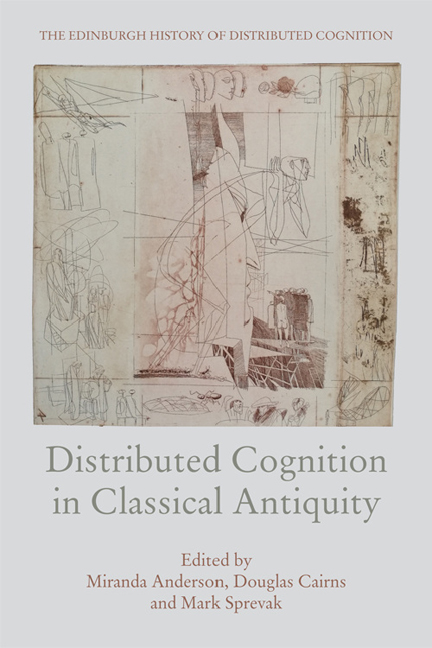Book contents
- Frontmatter
- Contents
- List of Illustrations
- Series Preface
- Miscellaneous Frontmatter
- 1 Distributed Cognition and the Humanities
- 2 Distributed Cognition and the Classics
- 3 Physical Sciences: Ptolemy's Extended Mind
- 4 Distributed Cognition and the Diffusion of Information Technologies in the Roman World
- 5 Mask as Mind Tool: A Methodology of Material Engagement
- 6 Embodied, Extended and Distributed Cognition in Roman Technical Practice
- 7 Roman-period Theatres as Distributed Cognitive Micro-ecologies
- 8 Cognition, Emotions and the Feeling Body in the Hippocratic Corpus
- 9 Enactivism and Embodied Cognition in Stoicism and Plato's Timaeus
- 10 Enargeia, Enactivism and the Ancient Readerly Imagination
- 11 Group Minds in Classical Athens? Chorus and Dēmos as Case Studies of Collective Cognition
- 12 One Soul in Two Bodies: Distributed Cognition and Ancient Greek Friendship
- 13 Distributed Cognition and its Discontents: A Dialogue across History and Artistic Genre
- Notes on Contributors
- Bibliography
- Index
Series Preface
Published online by Cambridge University Press: 12 November 2019
- Frontmatter
- Contents
- List of Illustrations
- Series Preface
- Miscellaneous Frontmatter
- 1 Distributed Cognition and the Humanities
- 2 Distributed Cognition and the Classics
- 3 Physical Sciences: Ptolemy's Extended Mind
- 4 Distributed Cognition and the Diffusion of Information Technologies in the Roman World
- 5 Mask as Mind Tool: A Methodology of Material Engagement
- 6 Embodied, Extended and Distributed Cognition in Roman Technical Practice
- 7 Roman-period Theatres as Distributed Cognitive Micro-ecologies
- 8 Cognition, Emotions and the Feeling Body in the Hippocratic Corpus
- 9 Enactivism and Embodied Cognition in Stoicism and Plato's Timaeus
- 10 Enargeia, Enactivism and the Ancient Readerly Imagination
- 11 Group Minds in Classical Athens? Chorus and Dēmos as Case Studies of Collective Cognition
- 12 One Soul in Two Bodies: Distributed Cognition and Ancient Greek Friendship
- 13 Distributed Cognition and its Discontents: A Dialogue across History and Artistic Genre
- Notes on Contributors
- Bibliography
- Index
Summary
This book, like the series of which it is part, explores the notion that the mind is spread out across brain, body and world, for which we have adopted ‘distributed cognition’ as the most comprehensive term. Distributed cognition primarily draws evidence from philosophy, cognitive science, psychology, linguistics and neuroscience. Distributed cognition covers an intertwined group of theories, which include enactivism and embodied, embedded and extended cognition, and which are also together known as ‘4E cognition’. An overview and explanation of the various strands of distributed cognition are provided in the general introduction.
Distributed cognition can be used as a methodology through which to pursue study of the humanities and is also evident in past practices and thought. Our series considers a wide range of works from classical antiquity to modernism in order to explore ways in which the humanities benefits from thinking of cognition as distributed via objects, language and social, technological and natural resources and environments, and to examine earlier notions that cognition is distributed. Theories of distributed cognition are transformative in terms of how we understand human nature and the humanities: they enable a different way of perceiving our interactions in the world, highlighting the significant role of texts and other cultural artefacts as part of a biologically based and environmentally grounded account of the mind. Theories of distributed cognition offer an opportunity to integrate the humanities and the sciences through an account that combines biologically and culturally situated aspects of the mind. The series illuminates the ways in which past ideas and practices of distributed cognition are historically and culturally inflected and highlights the cognitive significance of material, linguistic and other sociocultural developments. This evidence has the potential to feed back into cognitive science and philosophy of mind, casting new light on current definitions and debates.
Each volume provides a general and a period-specific introduction. The general introduction, which is replicated across all four volumes, aims to orientate readers unfamiliar with this area of research. It provides an overview of the different approaches within distributed cognition and discussion of the value of a distributed cognitive approach to the humanities.
- Type
- Chapter
- Information
- Distributed Cognition in Classical Antiquity , pp. vi - ixPublisher: Edinburgh University PressPrint publication year: 2017

